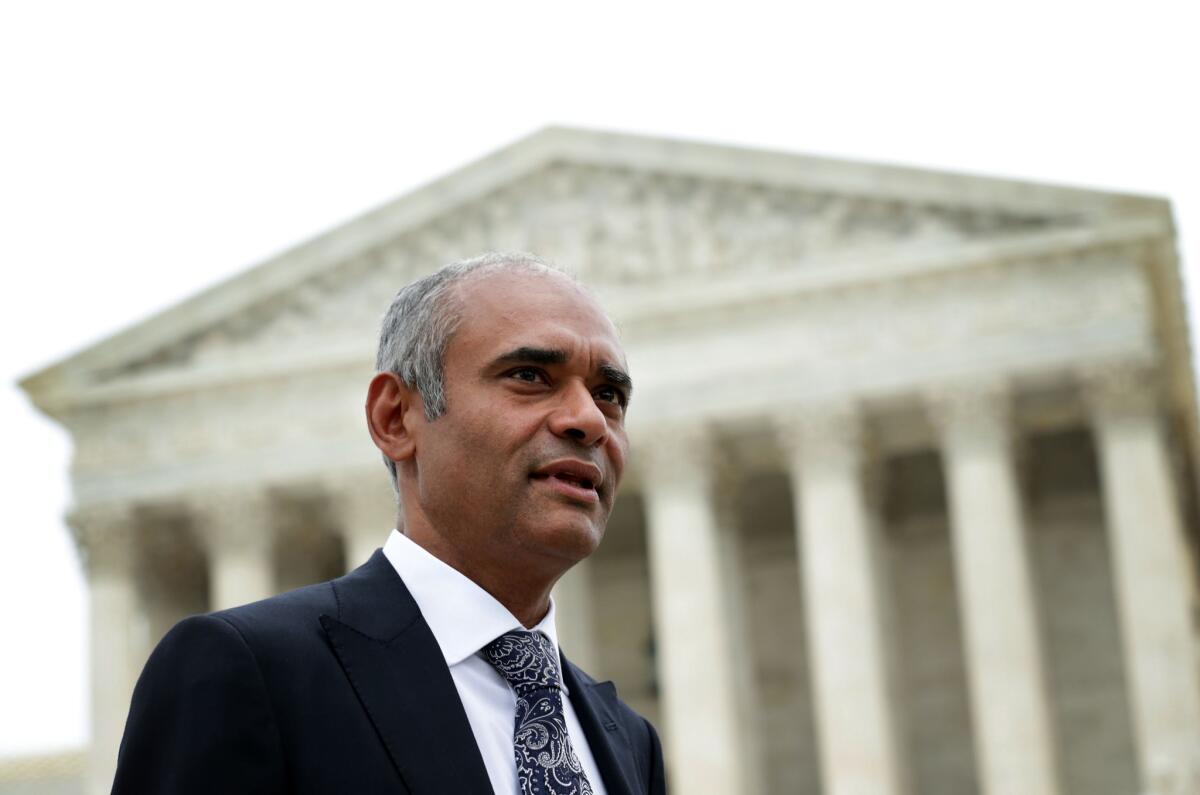Supreme Court rules against upstart Aereo TV service in copyright case

- Share via
Reporting from Washington — The Supreme Court sided with precedent and tradition in the television industry Wednesday over a technological innovation that justices suggested seemed a bit too clever, ruling that TV broadcasters have an exclusive copyright over the programs they transmit.
The 6-3 decision rejected a bold move by upstart Aereo, which claimed it had the right to capture and send TV signals to its customers over the Internet without paying licensing fees to broadcasters.
A win by Aereo had the potential to remake the TV and cable industries.
But Justice Stephen G. Breyer, speaking for the court, cited the history of Copyright Right Act of 1976, which was intended to prevent the then-new cable companies from capturing TV signals by an antenna and sending them to homes without paying broadcasters.
Under the law, cable companies have had to pay licensing fees to capture and send broadcast signals. That rule seemed set until Aereo came along and claimed it could rent tiny antennas to customers, capture signals over the air and let individuals watch their favorite TV shows for far less than they would have to pay cable companies.
Breyer and the court’s majority did not see much difference.
“For all practical purposes,” Aereo was acting like “a traditional cable system,” he said. “The many similarities between Aereo and cable companies, considered in light of Congress’ basic purposes in amending the Copyright Act, convince us that this difference is not critical here,” he said.
If cable and satellite companies are required to pay licensing fees before transmitting copyrighted TV signals, so is Aereo, he concluded.
Chief Justice John G. Roberts Jr. and Justices Anthony M. Kennedy, Ruth Bader Ginsburg, Sonia Sotomayor and Elena Kagan agreed.
The dissenters, led by Justice Antonin Scalia, said they were not convinced that Aereo was violating the Copyright Act as written. It referred to “public” performances, and it is not clear, Scalia said, why sending TV signals to an individual customer would be deemed a public performance.
In oral arguments earlier this year, two veteran Washington attorneys, Paul Clement and David Frederick, presented the contrasting arguments in the case, ABC vs. Aereo.
Clement, a former solicitor general who represented ABC and other broadcasters, called Aereo a “gimmick” that allows “thousands of paying strangers to watch live TV online” without paying a licensing fee to the broadcasters for their copyrighted programs.
But Aereo came up with what some say is an ingenious way around the law. It denies that its service amounts to a “public” airing of programs, but is merely a new way for individual consumers to watch programs they could see for free.
The service works like this: In New York, for examples, subscribers rent a tiny antenna devoted to their own individual use at a Brooklyn facility. Through it, they capture free over-the-air TV signals in the area. Frederick, representing Aereo, compared this to a set of old-fashioned “rabbit ears” on a TV set.
“It’s no different than if I’m at home, and I have an antenna or rabbit ears on my TV, and I know what channels I can get,” Frederick said. “Consumers have a right to get over-the-air signals that are free to the public,” he added.
He likened Aereo to the 1980s-era video recorders that allowed consumers to record copies of programs to be viewed at home. In 1984, the high court ruled that recording programs at home for later viewing did not violate copyright laws.
Justice Department attorney Malcolm Stewart, in a brief appearance, said the government agreed with broadcasters that Aereo was violating copyright laws by transmitting broadcast signals without a license. Among the broadcasters that urged the court to shut down Aereo was Tribune Co., parent company of the Los Angeles Times and Chicago Tribune.
Aereo charges as little as $8 a month for its service and allows subscribers to store 20 hours of programming or more for later viewing. Besides New York, it is available in Baltimore, Boston, Atlanta, Detroit, Cincinnati, Miami and several cities in Texas.
On Twitter: @DavidGSavage
More to Read
Sign up for Essential California
The most important California stories and recommendations in your inbox every morning.
You may occasionally receive promotional content from the Los Angeles Times.














